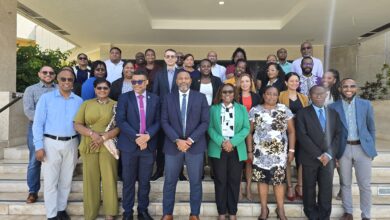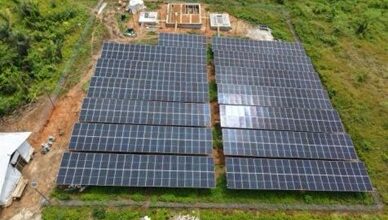Mr. Chairman
The Hon Prime Minister of St Kitts and Nevis, Dr. the Hon Denzil Douglas, Chair of the Council for Finance and Planning
The Right Honourable Owen Arthur Prime Minister of Barbados
Other Distinguished Ministers
Central Bank Governors
Representatives of International and Regional Institutions
Distinguished Delegates and Officials
Staff of the Caribbean Community Secretariat
Members of the Media
Ladies and Gentlemen
It gives me great pleasure to join the Hon. Minister of Finance of Guyana in welcoming you to this, the Tenth Meeting of the Council for Finance and Planning (COFAP). This is a particularly important meeting in light of the critical work which needs to be undertaken, especially but not solely for the establishment of the CARICOM Single Market and Economy.
As you know, this year has been designated “The Year of the Single Market”. It is therefore anticipated that all Member States will by December 2005 have had the necessary arrangements in place to propel the Region onto this considerably higher plane of integration from January 2006. At the same time, both the internal and the global environment dictate that we move with dispatch to advance consultations if we are to achieve the goal of establishing the Single Economy by 2008.
The forging of a Single Economy will inevitably require much more involvement and leadership from the COFAP than did the Single Market. The Revised Treaty gives COFAP the “primary responsibility for economic policy coordination and financial and monetary integration of Member States” – indispensable features of the Single Economy. This pursuit of the Single Economy would require a certain measure of pooling of their sovereignty by CARICOM Member States. And, the harmonisation of macro-economic and sectoral policies would involve the sacrificing of some measure of traditional national policy space.
We must also be aware that the distribution of costs and benefits deriving from the intensification of market integration as we pursue the single economy process would normally not be an equitable one. There will be winners and losers. Therefore, there must be adequate compensatory mechanisms that are effectively implemented to ensure a more equitable sharing of the costs and benefits than the market would normally yield, and to mitigate against any possible distortions and resulting disparities.
This is, to a large extent, the raison d'etre of Chapter 7 of the Revised Treaty of Chaguaramas, which deals with Disadvantaged Countries, Regions and Sectors. In this regard, today's meeting of COFAP has, as its very first substantive item, recommendations for the establishment and operation of a Development Fund – the centrepiece among the compensatory mechanisms of Chapter 7.
Mr. Chairman, delegates would recall that last year the Heads of Government decided to suspend their efforts at establishing a Regional Stabilisation Fund. Today, however, in that general vein we do have in place a Petroleum Stabilisation Fund through which the Government of Trinidad and Tobago has provided TT$300 million (approximately US$50M) for a year in the first instance, to support poverty reduction initiatives in the Community. This mechanism is a grant facility and is linked to the movement in oil prices. It is intended to provide relief to Member countries of CARICOM which are experiencing economic hardship arising from substantial price increases in crude oil and petroleum products.
In accordance with the decision of the Tenth Special Meeting of the Conference of Heads of Government in November 2004, it is expected that the three Ministers of Finance appointed to oversee the functioning of this Facility, will soon be determining the modalities that would govern the Management of the Fund and the selection of the Fund Manager. It is hoped that definitive positions on this matter will be taken at the upcoming July Meeting of the Heads of Government Conference.
An important area of work of this Meeting of COFAP relates to the various harmonisation instruments that are being crafted to complement and operationalise the basic macro-economic policy framework contained in the Revised Treaty of Chaguaramas and necessary for the Single Economy. One such instrument is the draft CARICOM Financial Services Agreement. This Draft Agreement has been revised since its presentation to the last COFAP Meeting. Within the last few weeks, it has also received further feedback by way of national consultations that have been held in Belize, Guyana, Jamaica and Trinidad and Tobago.
The second Instrument is a draft framework document relating to “Modalities for an Integrated CARICOM Stock Exchange System”. An integrated system is crucial for furthering the process of capital market development and financial services policy harmonisation.
A third instrument is the draft CARICOM Agreement on Investment that deals with intra-CARICOM capital flows. This draft has also been exposed to the views of stakeholders through national consultations in Belize, Guyana, Jamaica and Trinidad and Tobago.
As regards intra-CARICOM capital flows, there is already a massive increase partly in anticipation of the liberalisation of the Regional cross-border investment regime. For example, investment by Trinidad and Tobago in other parts of the Region has been reported at TT$250 million in 2004.
A fourth and companion instrument for consideration is the draft CARICOM Investment Code, which represents a harmonised regime for the treatment of investment from extra-Regional sources. With its adoption by Member States, foreign investors will have to contend with only one common Regional investment regime, rather than rules pertaining to fourteen (14) different investment jurisdictions. The schedule of completion agreed to at the last Heads of Government Conference requires that all of these instruments be finalised no later than mid-2006.
The devastation suffered by the Region during the last hurricane season and after forces me to draw attention to the critical issue of Catastrophe Risk Insurance. It will be recalled that, at the 15 September 2004 Emergency Meeting of the Conference of Heads of Government immediately after the havoc wreaked by Hurricane Ivan, it was agreed to “approach the World Bank to undertake a feasibility study on the provision of insurance coverage for public infrastructure in CARICOM Member States”. This was done and the World Bank has earmarked US$1.8 million from its Japanese Grant Facility for a feasibility study on an appropriate catastrophe insurance pooling mechanism.
In order to ensure the efficient and expeditious conduct of this study, Member States are urged to appoint their Liaison Officials without delay so that the project can make an early start. This matter is of the greatest significance to our Region's very survival. You may have noticed that it has been forecast that the frequency and intensity of storms and hurricanes for this year might be just as severe as last year.
At the same Emergency Meeting, the Conference of Heads had “mandated the next Meeting of the COFAP to discuss with Insurance Industry-leaders, issues relating to the underwriting of catastrophe risk and universal coverage, so that these can be put on a sustainable basis”. This matter is currently under active consideration.
Mr. Chairman, Ladies and Gentlemen, to ensure that the required momentum is maintained in pursuing the achievement of the many important issues falling to the responsibility of COFAP, consideration may have to be given to establishing an appropriate mechanism to advance the various processes in between meetings of the Council. Such a mechanism can be an Inter-Sessional Committee perhaps comprising the past, current and incoming chairpersons of the COFAP.
Mr. Chairman, in closing, there are many weighty and challenging issues on our Agenda today, the resolution of which would require our very best efforts. Let us therefore respond to this challenge in a manner that would make it possible to look back at this Tenth COFAP, as a Meeting when definitive progress was made, including towards the achievement of a Single Economy by the year 2008.
Finally, we must thank the Chairperson, the Acting Financial Secretary of the Ministry of Finance, St. Kitts and Nevis, Ms Janet Harris, and the other Officials for undertaking such a marathon and uninterrupted session yesterday in order to complete the preparatory work in a timely manner. We must also thank the Secretariat staff for working into the wee hours of this morning so as to have the Report of the Officials ready by 9.00 o'clock.
I thank you





